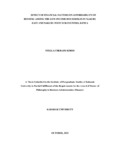EFFECT OF FINANCIAL FACTORS ON AFFORDABILITY OF HOUSING AMONG THE LOW-INCOME HOUSEHOLDS IN NAKURU EAST AND NAKURU WEST SUB-COUNTIES, KENYA
Abstract
Access to adequate and quality housing is considered as a key economic and social
right to all humans. Affordable housing is associated with a number of outcomes
including; social, health, development, financial and economic benefits. In Kenya,
there is a high shortage of housing in the urban areas due to rapid urbanization
resulting from natural population growth and the large scale rural-urban migration.
Nakuru County being one of the major urban areas in Kenya has been recorded as
experiencing housing shortage of 8,000 units per year due to the increased number of
investors, entrepreneurs and governmental institutions which have encouraged an
increased migration in search for employment in those sectors. The emerging situation
has resulted to a concerted effort by the National and County government and other
housing stakeholders in an attempt to understand the housing affordability challenges
and recommending possible solutions to the challenge. This study analyzed the effect
of financial factors on affordability of housing in Nakuru East and Nakuru West SubCounties.
The study focused on household‘s home owners and renters in the lower
income areas in the two sub counties with a view of understanding how the household
income, cost of financing, house price and financial management skills affects
housing affordability. The following theories guided the study; Modigliani‘s Life
Cycle Theory of Savings and Consumption, Classical theory of Interest rates and the
Housing Adjustment Theory. This study adopted a Positivist research philosophy and
a cross-sectional descriptive research design. The target population for the study was
392,587 household heads and managers of 80 housing stakeholder institutions in the
two sub counties. The study sampled 384 households‘ heads using stratified sampling
technique and 12 stakeholders‘ institutions using purposive sampling. Structured
questionnaire were constructed and used to collect data from the low-income
households while interview schedules were used to collect data from the housing
stakeholders. To ensure that the questionnaire helped collect reliable and valid data in
the same contextual environment, a pilot study on 38 households who did not
participate in the main study representing 10% of the sample size was drawn from
Nakuru East and Nakuru West Sub-Counties in Nakuru County. Validity and
Reliability tests were done and all items met the required set threshold. The data
obtained was analyzed descriptively using frequencies, mean and standard deviation
and inferentially using correlation and regression analysis. The study established a
positive and statistically significant moderate effect of income of household and
financial management skills on affordability of housing. On the other hand, the study
revealed negative and statistically significant moderate effect of cost of house
financing and house pricing on affordability of housing. The study further showed
that household income had the greatest effect on housing affordability, followed by
financial management skills, then cost of house financing and the least aspect was
house price. The study recommends that Government develops strategies that will
lead to increasing incomes to the low-income households through targeted financial
funding of business in the informal sector within the locality, introduction of targeted
financial literacy skills to the said group and also encouragement of key stakeholders
to develop affordable housing loans.

